The Difference Between Chicken Eggs vs Duck Eggs
If you are like most people, you grew up eating chicken eggs. You may have never tried, or even considered trying duck eggs. Until perhaps, you got some ducks, (or a friendly neighbor with ducks) and wonder, what in the world do I do with these eggs?! It took me awhile to appreciate the unique qualities of duck eggs. I have since learned how to use, and love both chicken eggs and duck eggs for their own unique purposes. What is the difference between chicken eggs vs duck eggs? Let’s discuss that in detail today.

Chicken eggs (laid by chickens) are the most commonly consumed egg in the world. Seen as a staple food in most kitchens. Whether they’re white, brown or green, farm fresh, and store bought, almost everyone has tried a chicken egg. They are most often consumed for breakfast, and used in baked goods. They’re easy to purchase as almost any super market.
Duck eggs (laid by ducks), on the other hand, are much less common. They’re rarely consumed regularly, and not found at just any grocery store. Most people have ever even seen a duck egg, let alone taste one. Yet they’re gaining traction in popularity due to their unique properties and benefits.
Let’s talk all about these 2 amazing types of eggs today!
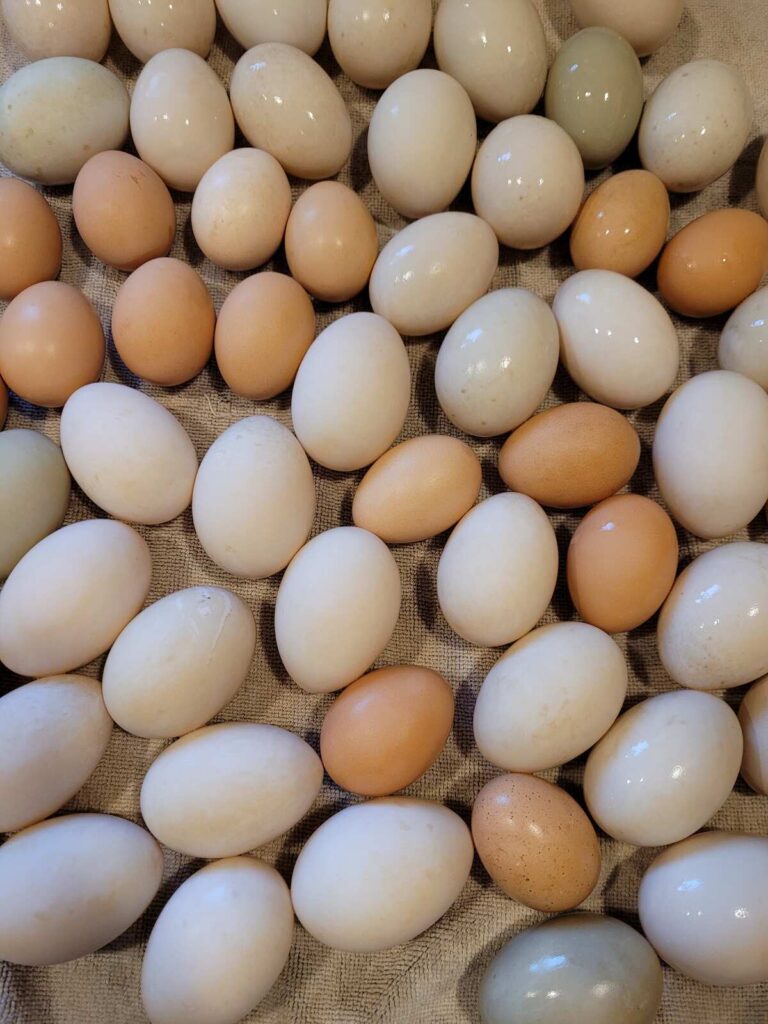
This post contains affiliate links, which means I make a small commission at no extra cost to you. Please read my full disclosure policy
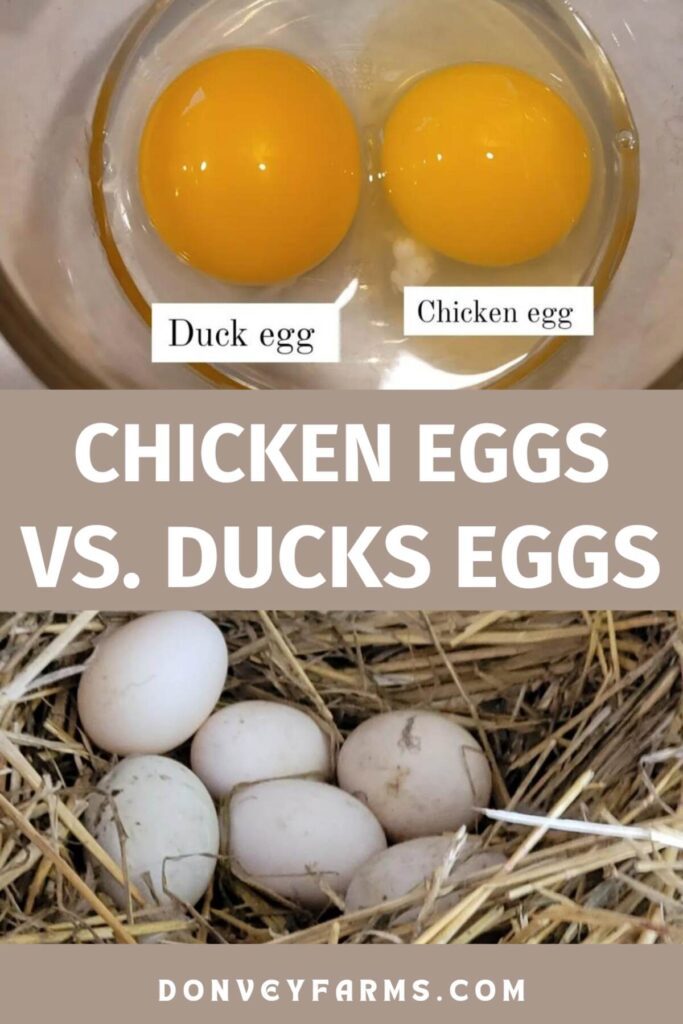
Egg Size And Appearance:
Chicken Eggs:
- A standard-size chicken egg, is smaller than a duck egg. Even a large chicken egg usually isn’t the same size as a regular duck egg.
- Store bought chicken eggs usually have a white or brown shell. Although, chicken eggs can come in a wide variety of different colors. From deep brown, to tan, pink, cream, green, blue, speckled, to almost anything in between. Many chicken owners buy chicken breeds that lay a variety of colors so that they can have “rainbow eggs”
- Chicken eggs have a thin shell that is relatively easy to crack. They have a bit of supple texture to the shell feel. They are an oval shape with a distinctly bigger and smaller side.
- Chicken eggs contain a yellow-tinged egg white, and a small to medium sized yolk that is light to dark yellow. Egg yolk color varies greatly based on their diet.
Duck Eggs:
- Duck egg shells much less variety in color. Ducks typically lay white eggs, but can also lay light blue/green (laid by Mallard ducks and Call ducks), or gray/ black (laid only by the cayuga duck).
- Duck eggs have a much thicker shell that can be surprisingly difficult to crack (especially if you’re used to chicken eggs). The inner membrane is thicker, and harder to separate when cracking the eggs. Duck eggs are very silky smooth and almost a soft feel. They are also oval shaped, but often have less of a curve to the bigger and smaller sides.
- The white of a duck egg is very clear, with a large to very large dark yellow to orange egg yolk.
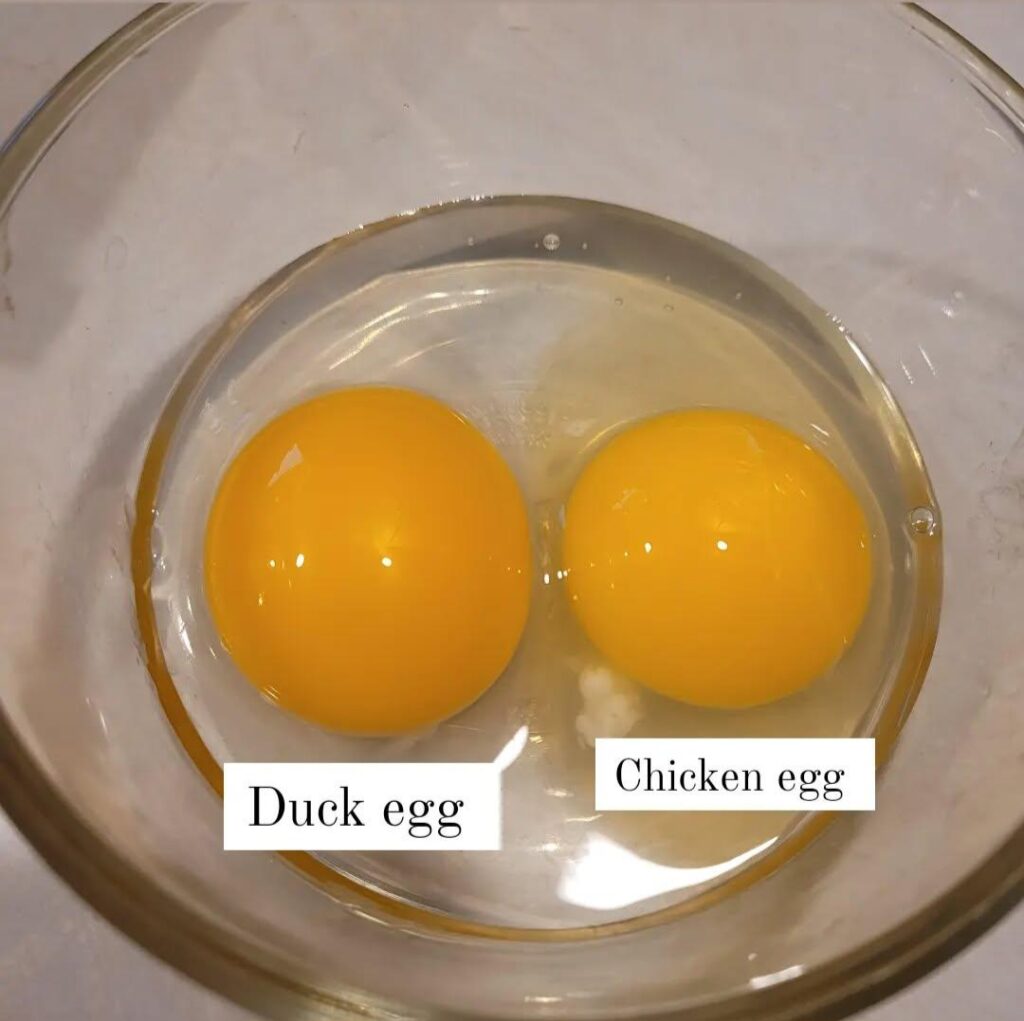
Nutritional Differences:
Chicken Eggs:
A chicken egg weighs on average 50g. The nutrition facts we are discussing below are based on a 50g egg.
- A single chicken egg contains roughly 5g fat, 6g protein, and less than 1g of carbs.
- There is an average of 72 calories in a single chicken egg.
- A single chicken egg contains 28mg calcium, 0.9mg iron, and 69mg potassium.
Duck Eggs:
A duck egg weighs on average 70g. The nutrition facts we are discussing below are based on a 70g egg.
- A single duck egg contains roughly 10g fat, 9g protein, and 1g of carbs.
- There is an average of 130 calories in a single chicken egg.
- A single duck egg contains 45mg calcium, 3mg iron, and 156mg potassium
Because of the higher volume, duck eggs have more nutrition. But the numbers show that duck eggs have overall more nutrition density per gram than chicken eggs.
That means even if you eat a smaller duck egg, you are getting more nutritional value than a same-size chicken egg.
Nutritional Comparison Table:
To make this nutritional breakdown little easier, here is a table comparing nutrition profiles for 3.5 ounces (100g) of cooked chicken and duck eggs:
| Duck Egg | Chicken Egg | |
|---|---|---|
| Calories | 223 | 149 |
| Protein | 12 grams | 10 grams |
| Fat | 18.5 grams | 11 grams |
| Carbs | 1.4 grams | 1.6 grams |
| Cholesterol | 276% of the Daily Value (DV) | 92% of the DV |
|---|
| Iron | 20% of the DV | 7% of the DV |
|---|
| Selenium | 62% of the DV | 43% of the DV |
|---|---|---|
| Thiamine | 10% of the DV | 3% of the DV |
| Vitamin A | 23% of the DV | 18% of the DV |
| Vitamin B6 | 15% of the DV | 8% of the DV |
| Vitamin B12 | 168% of the DV | 32% of the DV |
(information from healthline & grubly farms)
While both kind of eggs are very nutritious, duck eggs contain a significantly higher amount of potassium, calcium, iron, selenium, thiamine, Vitamins A, B6, And B 12.
Duck eggs also contain more fat than chicken eggs and are higher in omega-3 fatty acids. A duck egg contains about 71mg of omega-3s vs the 37mg found in chicken eggs.
It is also important to note, that duck eggs contain over double the amount of cholesterol per gram than chicken eggs. These higher cholesterol levels typically don’t affect people, but if you are watching your cholesterol, chicken eggs may be the best egg for you.
Both chicken and duck eggs are packed with essential nutrients they also contain high amount of protein and fat, making them excellent low-carb food source and an overall healthy food choice.
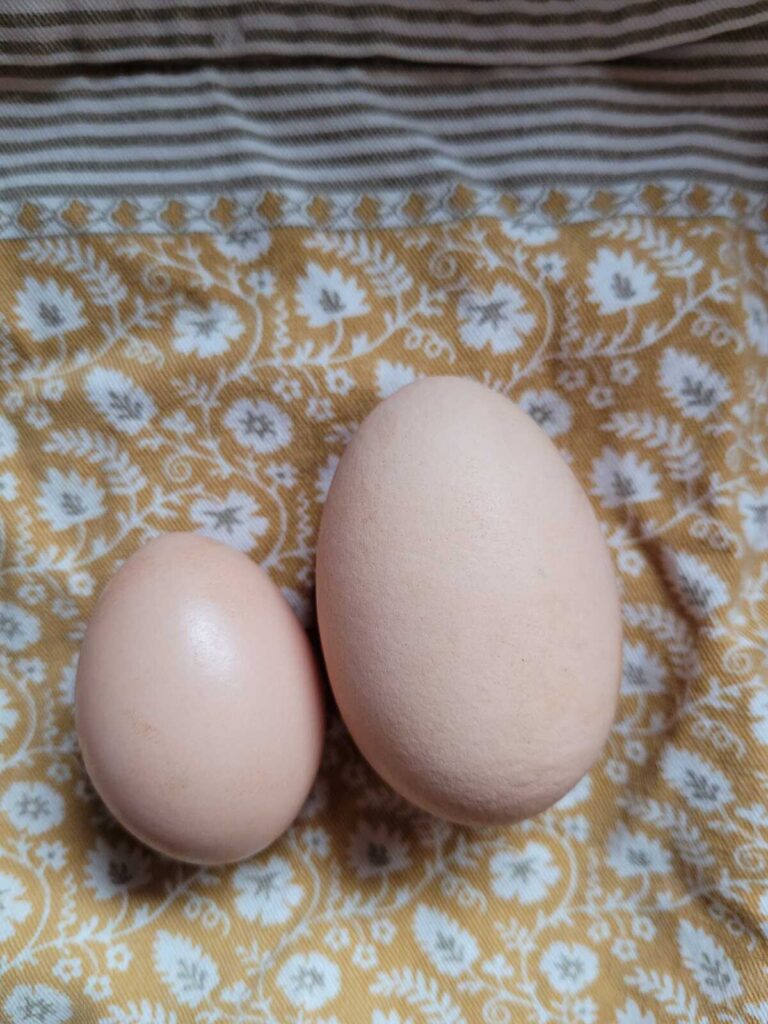
Texture & Cooking:
Chicken eggs:
Light, more airy and dry mostly noticeable when making scrambled eggs or frying.
Both chicken and duck eggs can be kept at room temperature if fresh from the coop and unwashed.
Duck eggs:
The taste of duck eggs can be a little stronger and require getting used to, especially if you’re just trying them for the first time.
When boiled, the texture of duck eggs is quite different. The white is thicker to bite through, but the yolk has a much creamier taste making hard-boiled duck eggs a delicious alternative to hard-boiled chicken eggs.
Duck eggs are wetter, with a more dense texture and richer flavor. Making them beloved by pastry chefs for baking and in dishes that require more structure or creamier texture like crème brûlée or homemade ice cream. The duck egg yolks are so large, they make any baked good more rich.
Duck egg whites hold more structure when whipped than chicken egg whites.
Ideal for cooking and baking but can also be fried into a rich omelette. When frying or scrambling you’ll notice the eggs are much more yellow, this is also because of the much larger yolk.
How to Substitute Duck Eggs Vs Chicken Eggs In Recipes:
When substituting duck eggs for chicken eggs in recipes, generally the substitution rate it this:
1 duck egg for every 1.5 chicken eggs.
So if a recipe calls for 3 chicken eggs, you only need to use 2 duck eggs! For recipes with 1 chicken egg, you can substitute for 1 duck egg, or whisk the duck egg and measure out 50g of duck egg to equal the measurement of an average chicken egg.
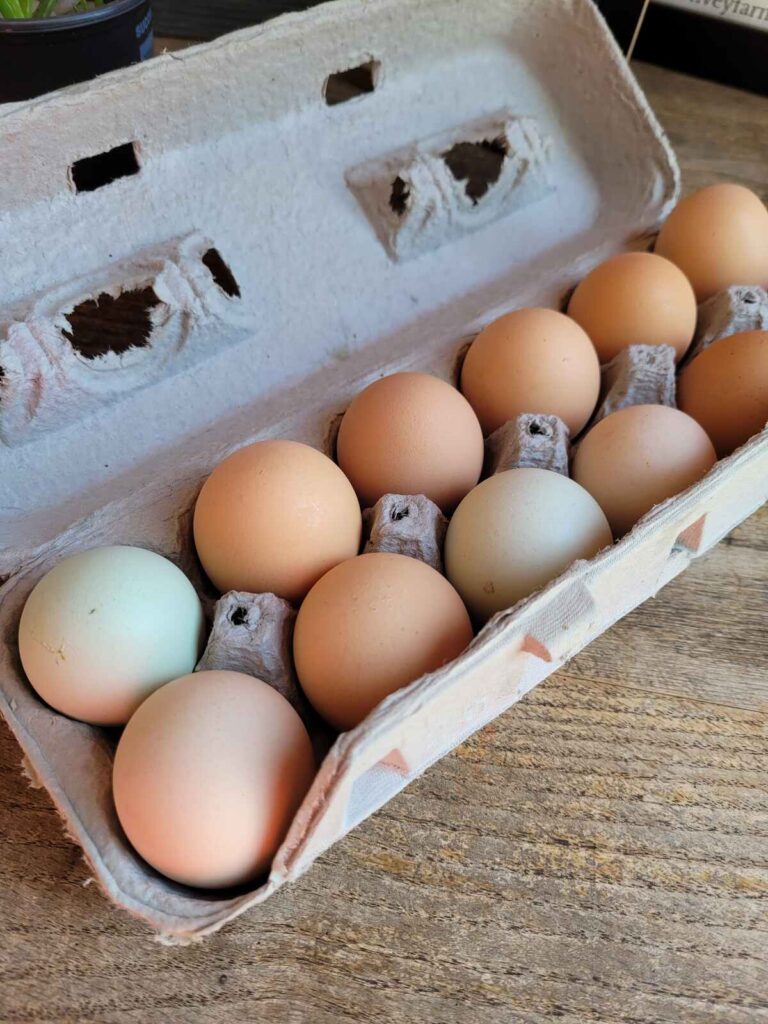
Allergies and Sensitivities:
You may find, that if you are sensitive or allergic to either chicken or duck eggs, you can have one or the other without having a reaction. This is due to the differences in protein structure and how it affects digestion or allergic reactions.
I have known multiple people who are allergic to chicken eggs, but can have duck eggs- and vice versa. If you find you cannot tolerate either chicken or duck eggs, quail eggs might still be tolerable for you!
This is also due to the different proteins in each different type of egg, and is so interesting! You can usually find quail eggs at specialty stores or a local farmers market.

Where To Get Eggs & Cost
Chicken eggs are generally easy to find in the grocery store. (Unless it’s 2025 and there’s national egg shortages in the US)
They are also usually fairly affordable, even if you choose to buy free-range organic.
Duck eggs can be harder to find. They aren’t usually available at just any grocery store. Usually you can find them at specialty or health food stores and farmers markets.
Duck eggs are usually more expensive than chicken eggs.
Raising Ducks VS Chickens
If this blog post has sparked your interest in raising chickens or ducks yourself, I wrote a post dedicated to the difference between owning ducks vs chickens for you to reference before deciding what kind of poultry to buy!

Conclusion:
Both chicken eggs and duck eggs offer distinct advantages, and choosing between the two largely depends on your personal taste, nutritional needs, and culinary goals. Chicken eggs are a staple in most households, known for their mild flavor and versatility in everyday cooking and baking. On the other hand, duck eggs stand out with their richer flavor, larger yolks, and higher nutritional content, especially in terms of vitamins, minerals, and omega-3 fatty acids.
While duck eggs may require a bit of adjustment in terms of taste and texture, they can elevate certain dishes, particularly baked goods, to a whole new level. Whether you choose to stick with the traditional chicken egg or venture into the world of duck eggs, both offer unique benefits and can be enjoyed in various ways.
So, next time you find yourself at a farmer’s market or considering a new addition to your backyard flock, you may just want to give duck eggs a try!

Reference Links:
Single Chicken Egg Nutrition: https://www.nutritionix.com/food/chicken-egg
Single Duck Egg Nutrition: https://www.nutritionix.com/food/duck-egg
Nutritional table information: https://www.healthline.com/nutrition/duck-eggs-vs-chicken-eggs#nutritional-comparison
Chicken VS Duck Egg fat content: https://grubblyfarms.com/blogs/the-flyer/comparing-chicken-eggs-vs-duck-eggs-everything-you-need-to-know#:~:text=Duck%20eggs%20have%20more%20fat,sodium%2C%20potassium%2C%20and%20manganese.
Which Kind Of Egg Do You Prefer?
Please comment your experience down below!
Want to know more about me? Find my story here:
This post contains affiliate links, which means I make a small commission at no extra cost to you. Please read my full disclosure policy here

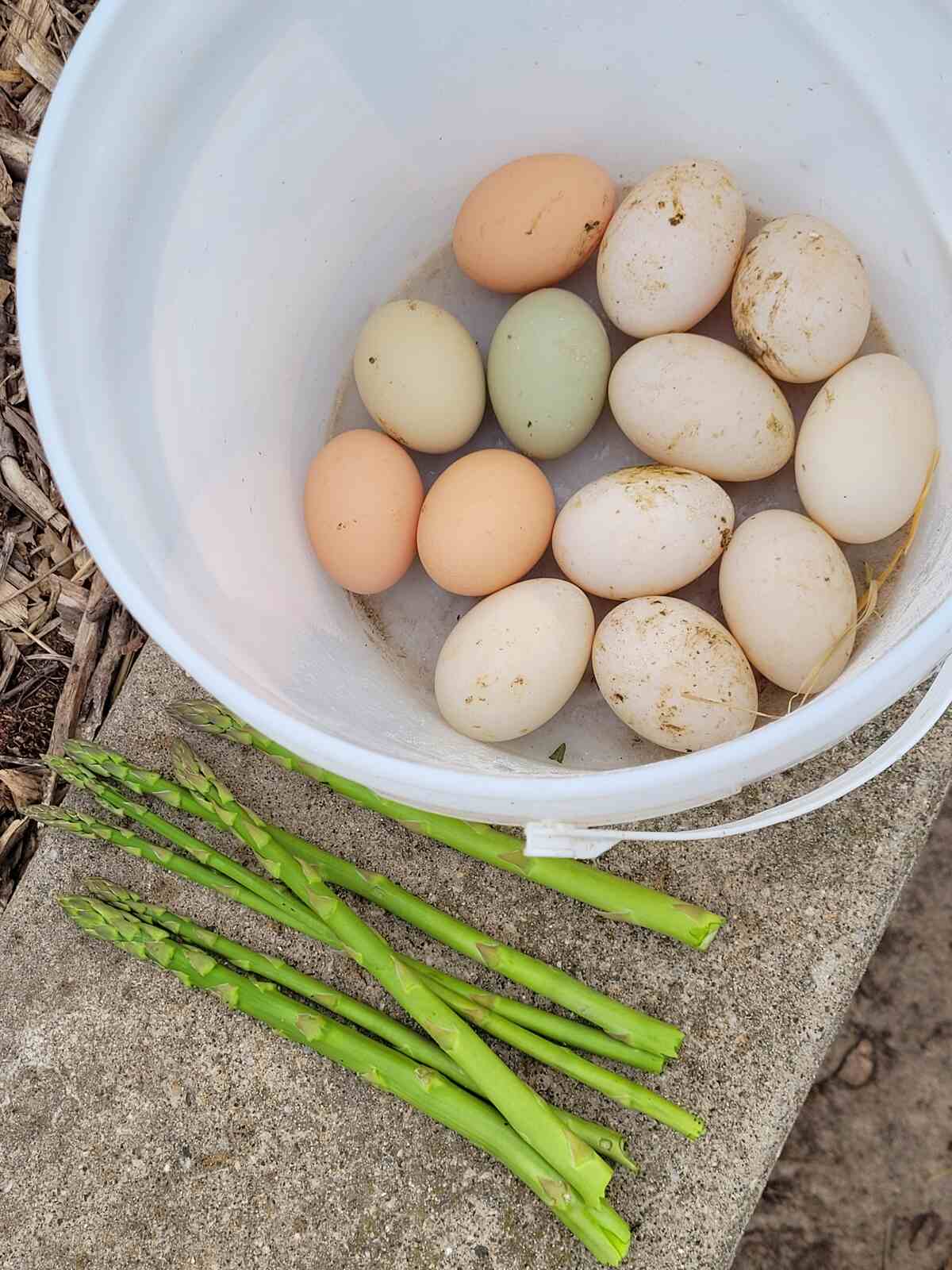






Wow, thank you for all the information especially the side by side nutrition vs chicken eggs.